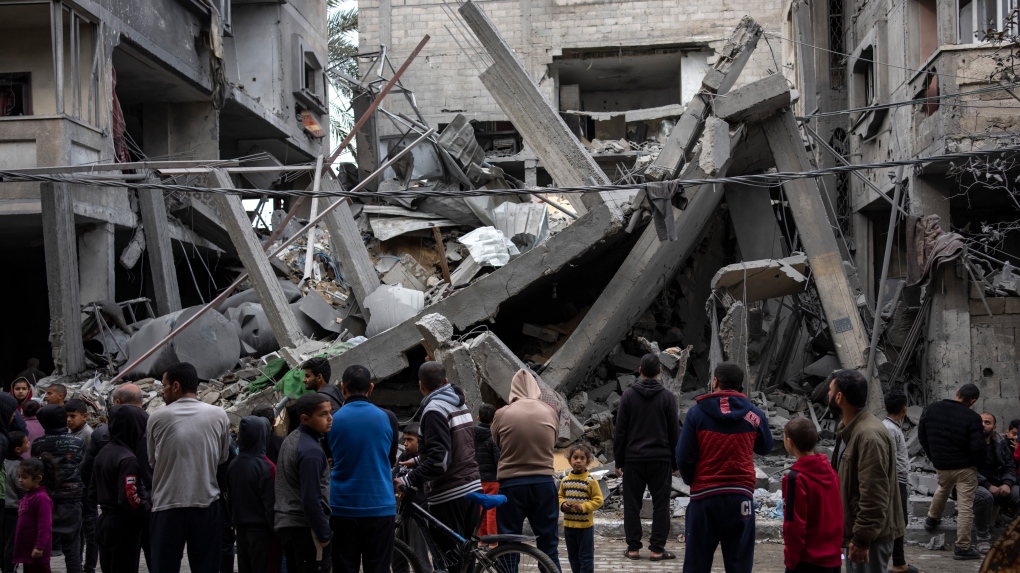Let it never be said that your
Lineeditors are not receptive to the wishes of you, our paying readers. We’d gotten a few emails over the past few weeks asking us our thoughts on the Israel-Hamas conflict, which we had covered extensively, but less so lately.
The simple truth is, we weren’t sure there was much value in a weekly comment to the effect of: the war continues, and it is terrible. We’ve limited ourselves more to commentary on and analysis of how the war is shaping our domestic politics and society. It seemed the better use of our time.
On that front, we couldn’t help but roll our eyes this week at the political grandstanding around the NDP’s proposed motion on recognizing Palestine as a state. We felt that that was dumb. Palestine isn’t a state. We
want it to be one, one day, but it isn’t, today. The Palestinian people have two states — a semi-functional West Bank run by largely despised corrupt autocrats, and a network of terror tunnels built under a bomb crater in Gaza. Recognizing
that as a state today is the most pointless of symbolic gestures, which probably goes most of the way to explaining why the NDP was so enamoured with the idea.
The Liberals, to our view, handled the issue fairly well, politically. That’s the part they’re good at. They negotiated the NDP’s proposal down to a series of statements that basically simply reiterated what Canadian policy already is and then voted in favour of the status quo. Then they all hugged. A dramatic and then celebrated vote in favour of the status quo by Liberals and New Democrats is maybe not the best optic for either of them, but hey.
Pragmatically, of course, it was an exercise in stupidity. To the extent there was anything new, such as the decision to suspend weapon exports to Israel, the Liberals rapidly discovered that they had beclowned themselves: Canada isn’t exporting weapons to Israel, which our own government seemed not to realize until they announced that we would stop. Israel exports military technology to us, though — or did. Stay tuned, we guess.
We chided the NDP above for their love of useless symbolism, and regret to report that this is a weakness shared by our Liberals, who — in extremely typical fashion — were so seized with the urgent need to be seen doing something that they didn’t take the 45 seconds necessary to discover that we were committing ourselves to stop doing something we weren’t actually doing.
Canadian foreign policy under Trudeau in a nutshell, that. Why do a thing when you can just pledge to not do a thing you’re already not doing?
Canada Is Back™.
The absurdity of it all was really captured by a comment by NDP MP Heather McPherson, the party’s foreign affairs critic and one of the authors of the original NDP motion. She met with pro-Palestinian activists after the vote, and then sadly told reporters after, “I'm not going to lie. I wish that I could have delivered to them statehood for Palestinian people.”
Well, gee, Heather, you hard-headed realist and obviously very serious person, you. Maybe if you’d just
tried harder, you — a member of the fourth-largest party in the Canadian parliament, who clearly stands astride the world like some kind of diplomatic colossus — would have been able to take Palestinian statehood, deposit it in a lovely wicker basket, throw in some chocolate and jars of olives and maybe a candle, smother it all in those little strips of paper, and then hand-deliver it personally to the people of Gaza. Ta da! Statehood!
Way to let them down, ma’am.
Good Lord. Like what can we say in the face of that level of delusional self-regard? This is the kind of deep-thinking that animates the NDP and that the Liberals need to placate. Makes you feel good about how things are going in Ottawa, eh?

More seriously: Many Jewish Canadians were disappointed by the vote, and we get that. But this was inevitable. The political centre-of-gravity on this was always going to pull Justin Trudeau in this direction. We are weirdly impressed, in a way, that it took this long. This is another kick in the gut for many Canadian Jews, who remain alarmed not just by the protests and criminal violence directed at them and their cultural and religious sites, but especially the manifest refusal of police to protect them. We wish we had words of reassurance to offer. We don’t.
That covers off the latest at home. What about the war itself?
Sigh. Go freshen your drink, friends.
We understand that the destruction in Gaza and the loss of civilian life, particularly of children, has proven too much for some to bear, pushing them to now believe that a ceasefire is necessary, so as to avoid further destruction and loss.
Sure. We get it. We expected it. Any halfway informed observer understood that Israel’s public support would diminish with time as the war ground on. As for us at
The Line, our position hasn’t changed. We continue to support the war and its aims. This should not be — it will be, we know, but it should not be — interpreted as some
carte blanche approval of Benjamin Netanyahu or a declaration of Israel perfection. Far from it. We do not condone all that Israel has done, and we are no fans of Netanyahu. Rather, we are simply saddened to report that thus far, the war has proceeded generally as we expected. That’s why the compounding horrors of the last few months haven’t moved our opinion. They were baked in, as it were.
Seriously, folks. Why do you think we were so glum in the immediate aftermath of the attack on Israel? Some of it was obviously the tremendous depravity of the attack itself and all the suffering it caused. But a lot of it was also the certainty that Israel was going to drop the gloves and do everything it could to finish the job this time, civilian casualties be damned. Israel wasn’t going to launch a surgical operation aimed at materially degrading Hamas’s rocket force over the medium term,
it was going to wage war to destroy totally destroy Hamas as an organization.
We understood that on the first day, and also understood what that was going to look like. Some of you, seemingly, did not.
Indeed, before Israel’s main attack began,
Line editor Gurney sketched out during an interview with broadcaster Charles Adler what such a campaign would likely look like, using nothing more than broad historical comparisons and military rules of thumb. Gurney estimated that civilian deaths would be at least in the 30,000-50,000 range, because, typically, a trained military force attacking an enemy force inside an urban area has inflicted somewhere between 10 to 0.5 civilian casualties for every enemy combatant killed.
That’s a hugely broad range, we grant, but that’s what history tells us. Indeed, Gaza would normally be expected to be on the higher range of that scale — it is densely populated and there is nowhere for the civilian population to evacuate: a worst-case scenario for collateral damage. Hamas had a pre-war fighting strength of an estimated 30,000-40,000. Killing half, an approximate minimum traditionally required to render a military force combat ineffective, would accordingly mean killing 15,000-20,000 terrorists.
Do the math. The expected range of civilian casualties was therefore anywhere from 7,500 to 200,000.
The estimated total death toll in Gaza is, to date, between 30,000 and 35,000. That’s likely an undercount, but it’s the available figure, so we’ll run with it. Some of those are undoubtedly Hamas terrorists; Israel claims that it has killed at least 10,000. We don’t automatically accept that number, but just for the sake of argument, let’s run with that one, too. That leaves us with 20,000-25,000 civilian dead. The keen reader will note that that is closer to the lower end of the range, despite Gaza being an environment where we’d expect the civilian losses to be on the high end.
This is why we scoff at the accusations of genocide. Westerners have truly forgotten what war — real wars, not little police actions or brushfire conflicts — looks like. It looks like Gaza today.
We know the above analysis will be off-putting to many. It’s cold and clinical. We can only repeat that we are not immune to the sadness and horror many feel. But war is as much about numbers as anything, and these are the numbers.
Will Israel succeed? We don’t know. We hope so. But we sure as hell appreciate that tut-tutting from the sidelines wasn’t going to be a deterrent. And for those newly among the “Ceasefire now!” chorus, you have every right to your moral convictions, but if that isn’t balanced with an understanding of why Israel DGAF about your feelings, we don’t know what to tell you.






